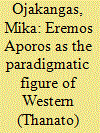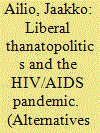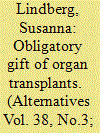|
|
|
Sort Order |
|
|
|
Items / Page
|
|
|
|
|
|
|
| Srl | Item |
| 1 |
ID:
122993


|
|
|
|
|
| Publication |
2013.
|
| Summary/Abstract |
The originary figure of the Western political subject is neither the Aristotelian zoon politikon nor the Agambenian homo sacer but the Socratic eremos aporos. Like the Agambenian homo sacer, the Socratic eremos aporos is abandoned by his fellow citizens, not outside the polis but in the polis, being a refugee in his own city. He lives, as Callicles says of Socrates in Gorgias (486c), "in his city as an absolute outcast." Moreover, like the Agambenian homo sacer, the Socratic eremos aporos also lives in a state close to death-"in a state as close to death as possible," as Socrates says of himself in Phaedo (67d). However, there is a decisive difference between the Agambenian homo sacer and the Socratic eremos aporos. Unlike homo sacer, the Socratic political subject is not abandoned by the sovereign but by himself through his own traumatic self-accusation. Furthermore, although eremos aporos is also a "living corpse," he is not thereby at mercy of the sovereign. On the contrary, it is he who has become sovereign, not because he has somehow managed to sublate his condition as abandoned and forlorn subject, but because this condition is the condition of sovereign freedom. In other words, it is neither his biological life in the order of nature (zoe) nor his form of life in the symbolic order of the polis (bios), not even his exposure to the threat of imminent death (homo sacer), but his symbolic suicide that renders him a sovereign individual subjected to no one. By removing the subject from his proper place in the symbolic order of the polis, such a suicide not only discloses subject's unlimited responsibility but also renders him capable of transcending his limited position as a living being and becoming a thanatopolitical subject of his own biological death. Although such a subject also affirms life, life that is affirmed here is not mere life but sovereign life in the shade of the instinct of death.
|
|
|
|
|
|
|
|
|
|
|
|
|
|
|
|
| 2 |
ID:
122997


|
|
|
|
|
| Publication |
2013.
|
| Summary/Abstract |
The strength of Roberto Esposito's immunitary reading of biopolitics lies in its ability to bring together biopolitics and thanatopolitics without fully collapsing them into each other. However, although Esposito has carefully elaborated the thanatopolitical tendency within Nazi biopolitics, the very idea of liberal thanatopolitics appears to be foreign to him. Despite the neglect of such a combination in Esposito's thought, this article considers precisely this possibility. Befitting Esposito's theory of immunity, this is done by focusing on the liberal efforts to halt the pandemic caused by the human immunodeficiency virus (HIV). We discuss the hypothesis that the liberal insistence on the primacy of personified human life in the face of a dehumanizing pandemic systematically places many HIV-positive people in a zone of indistinguishability between full human existence and merely being alive in a thanatopolitical fashion.
|
|
|
|
|
|
|
|
|
|
|
|
|
|
|
|
| 3 |
ID:
122996


|
|
|
|
|
| Publication |
2013.
|
| Summary/Abstract |
Recent debates on biopolitics have focused on negative and positive interpretations of "life" that is the object of biopolitical apparatuses. Agamben examines the "bare life" that is produced by the sovereign ban, Negri and Hardt speak on the contrary of emancipatory biopolitical production, while Derrida and Esposito study (auto-)immunitary reactions that constitute living beings. The aim of this article is to examine a concrete case that permits to evaluate the explanatory power of these positions. The test case pertains to the recent amendment of the Finnish law on the medical use of human organs, tissues, and cells. It shows very clearly how phenomena that conventionally constitute the basis of proper, personal existence, namely the biological body and death, are not natural phenomena anymore, insofar as they are delimited by biopolitical decisions, that also redefine social relations in a radical manner.
|
|
|
|
|
|
|
|
|
|
|
|
|
|
|
|
|
|
|
|
|